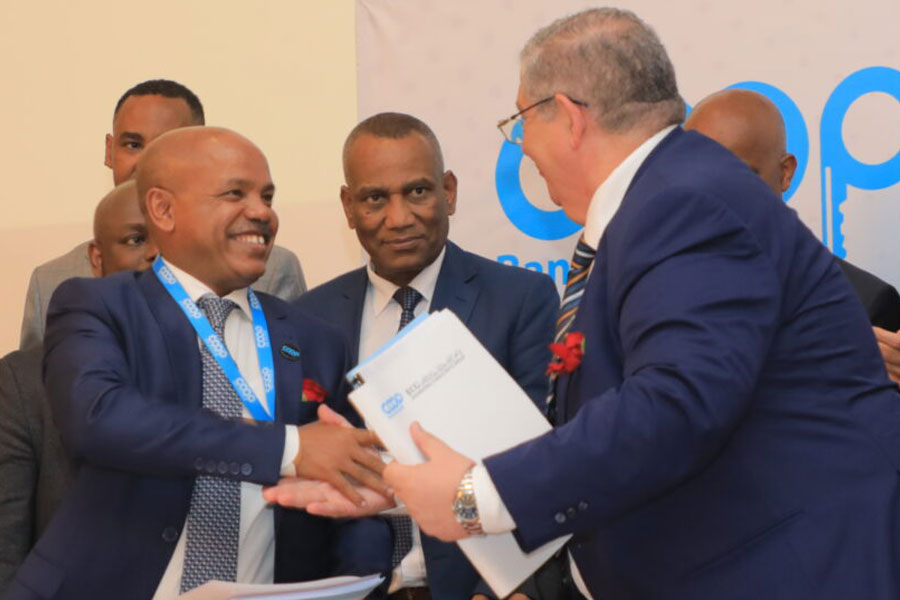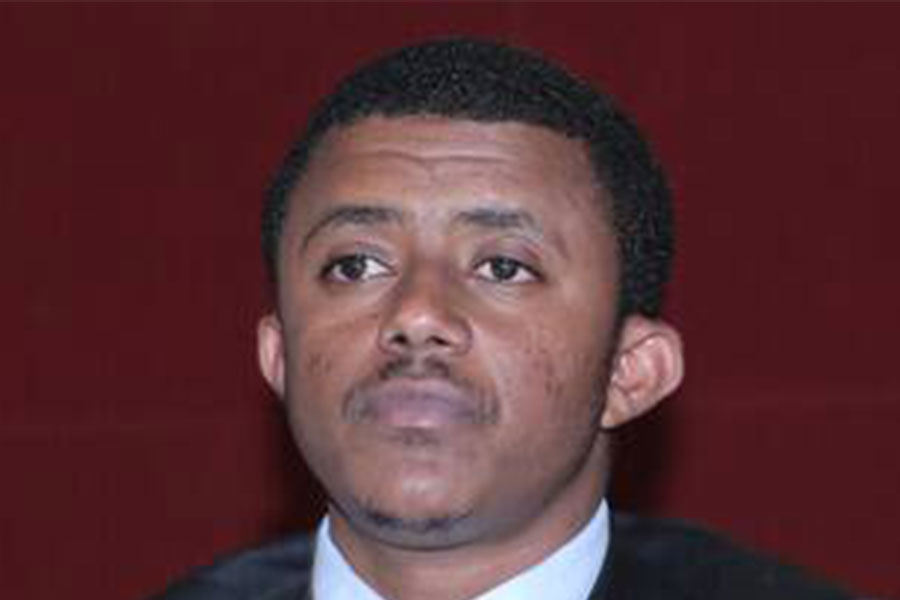
Fortune News | Apr 22,2023
Apr 6 , 2024
By Paola Subacchi , Rosa M. Lastra
The debate about confiscating Russia's assets to fund Ukraine's defence illuminates the urgent need for a multilateral framework to govern financial sanctions. With Donald Trump's potential return next year, the stability and fairness of global financial governance are more pressing than ever. Paola Subacchi, an incoming chair of Sovereign Debt at Sciences Po, and Rosa M. Lastra, chair of Banking Law at Queen Mary University of London, argue in this commentary provided by Project Syndicate (PS), that such a framework could ensure that sanctions serve as a tool for justice and deterrence, not arbitrary punishment.
As Russia's war against Ukraine enters its third year, Western governments are finding it increasingly difficult to muster the funding Ukraine needs to defend itself. The European Union struggled to reach a 54 billion dollar aid deal in February, and the United States remains deadlocked over its 60 billion dollar funding package. Calls to use Russia's assets to fund the Ukrainian war effort are growing louder.
At stake are some 300 billion dollars in central bank reserves, which Western governments – including the EU and the US – froze immediately after Russia invaded to punish Russia and limit the resources it could use to finance its aggression. The sanctions against Russia triggered by its 2014 annexation of Crimea were far less extensive than those imposed in 2022. It was a radical move. The last time comprehensive financial sanctions were imposed on a major country, with broad – though not universal – international acceptance, was in the 1930s, against Italy and Japan.
The US now wants to take an even bolder step, confiscating Russia's assets and transferring them to Ukraine. Its argument is straightforward: Russia should be made to compensate Ukraine for its illegal and highly destructive war. Russia's central bank reserves would fulfil – at least in part – Ukraine's valid claims for war damages. But, even if the US – with the support of the EU and the G7 – manages to craft a plausible legal argument for confiscating Russia's reserves, it is not clear that this would be the right move.
Seizing Russia's assets would represent a significant escalation, jeopardizing Western dominance in the international monetary and financial system and establishing a dangerous precedent in international law.
Financial sanctions are a weapon that affects a country's external monetary sovereignty and its ability to manage its currency, reserves, and payment system. Like any other powerful weapon, they should be deployed in accordance with international legal principles and transparent governance. To this end, the G7 and the G20, together with the international financial institutions, should create a multilateral framework to govern financial sanctions' use.
Such a framework must recognize the US dollar's critical role in the international monetary system, as both a vehicle currency and a reserve asset. The Dollar's dominance – its international liquidity and acceptance remain unmatched – means that countries are willing to limit their monetary sovereignty for the convenience of using the greenback. Today, approximately 80pc of international trade transactions, and 60pc of global payments, are carried out in Dollars.
There is little reason to expect this to change any time soon. As then-US Treasury Secretary John Connally famously put it in 1971, "the Dollar is our currency, but your problem." With the US and its allies embracing financial sanctions to achieve geopolitical objectives, Connally's dictum might be even more valid today, with implications that extend well beyond the war in Ukraine.
Some countries and regional blocs – such as the BRICS, which now comprises Brazil, Russia, India, China, South Africa, Egypt, Ethiopia, Iran, and the United Arab Emirates – are pushing for alternative payment systems less reliant on the Dollar. The China-led Cross-Border Interbank Payment System (CIPS) and Digital Currency Electronic Payment (DCEP) system are intended to act as an alternative to the Western-led Society for Worldwide Interbank Financial Telecommunication (SWIFT) platform.
While the emerging alternative monetary and payment systems would not replace the existing architecture – at least not soon – they could lead to fragmentation of rules, standards, and even institutions, causing even more international tension and instability. What a peaceful and prosperous world requires are shared institutions and rules.
The prospect of former US President Donald Trump's possible return to the White House in 2025 makes a system of global governance of financial sanctions all the more urgent. Regardless of who is in charge in 2025, countries that depend on the US dollar for saving and borrowing, invoicing and settling trade transactions, must be able to trust that their assets will not be seized or frozen, and their ability to make international payments will not be curtailed on a political whim.
A multilateral framework governing financial sanctions would allow for their use in extreme situations, such as when a country violates international law by launching an unprovoked invasion of another sovereign's territory. As was the case with Russia, this can serve both to punish illegal behaviour and curb perpetrators' capacity to continue engaging in it while deterring similar behaviour by others.
But such a framework would also establish conditions that must be met before sanctions could be applied—beginning with the requirement that a clear breach of international law has occurred—so that they are not imposed on flimsy grounds. It would also include mechanisms to ensure accountability for violations. Only then can the global financial system continue to function in a way that benefits all countries that depend on it, not just those in charge.
PUBLISHED ON
Apr 06,2024 [ VOL
25 , NO
1249]

Fortune News | Apr 22,2023

Verbatim | May 03,2024

Commentaries | Sep 06,2020

Viewpoints | Sep 10,2023

Radar | Jul 29,2023

Commentaries | Mar 18,2023

Fortune News | Apr 19,2025

Viewpoints | Jul 13,2020

Commentaries | Jun 07,2025

Viewpoints | Oct 25,2025

Photo Gallery | 178758 Views | May 06,2019

Photo Gallery | 168955 Views | Apr 26,2019

Photo Gallery | 159797 Views | Oct 06,2021

My Opinion | 137109 Views | Aug 14,2021
Commentaries | Oct 25,2025

Dec 22 , 2024 . By TIZITA SHEWAFERAW
Charged with transforming colossal state-owned enterprises into modern and competitiv...

Aug 18 , 2024 . By AKSAH ITALO
Although predictable Yonas Zerihun's job in the ride-hailing service is not immune to...

Jul 28 , 2024 . By TIZITA SHEWAFERAW
Unhabitual, perhaps too many, Samuel Gebreyohannes, 38, used to occasionally enjoy a couple of beers at breakfast. However, he recently swit...

Jul 13 , 2024 . By AKSAH ITALO
Investors who rely on tractors, trucks, and field vehicles for commuting, transporting commodities, and f...

Oct 25 , 2025
The regulatory machinery is on overdrive. In only two years, no fewer than 35 new pro...

Oct 18 , 2025
The political establishment, notably the ruling party and its top brass, has become p...

Oct 11 , 2025
Ladislas Farago, a roving Associated Press (AP) correspondent, arrived in Ethiopia in...

Oct 4 , 2025
Eyob Tekalegn (PhD) had been in the Governor's chair for only weeks when, on Septembe...

Oct 25 , 2025 . By YITBAREK GETACHEW
Officials of the Addis Abeba's Education Bureau have embarked on an ambitious experim...

Oct 26 , 2025 . By YITBAREK GETACHEW
The federal government is making a landmark shift in its investment incentive regime...

Oct 29 , 2025 . By NAHOM AYELE
The National Bank of Ethiopia (NBE) is preparing to issue a directive that will funda...

Oct 26 , 2025 . By SURAFEL MULUGETA
A community of booksellers shadowing the Ethiopian National Theatre has been jolted b...